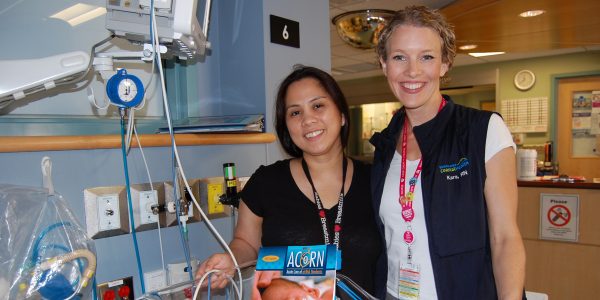Healthy newborns grow from ACoRN training
Stabilization of the at-risk or unwell newborn is most effective when performed by a coordinated, interdisciplinary team. To this end, 15 Richmond Hospital staff members received two-day training in the Acute Care of At-Risk Newborns, otherwise known as ACoRN training.
“This is probably one of the best classes I ever attended,” said Kara Thompson, Clinical Resource Nurse, Richmond Birth Centre. “It incorporated our own hands-on scenarios where we are able to run through during the workshop.”
ACoRN is a Canadian neonatal stabilization program designed for at -risk and unwell newborns. The course, held at Richmond Hospital, was attended by pediatricians and RNs from the emergency department, birth centre, the neonatal ICU, and respiratory therapy.
Taking a systematic approach to providing newborn care
ACoRN training applies a systematic approach, via a multi-pronged assessment tool, to determine if a newborn is at-risk of post-natal complications. By working through the ACoRN process, Birth Centre and NICU staff can quickly assess a baby and, if needed, expedite access to care.
“Parents coming to the Richmond Hospital Birth Centre can take comfort in knowing that our staff have access to this Best Practice knowledge, “said Thompson. “At all times on the unit, there are staff available who can quickly assess a baby to determine if it’s turning a corner and becoming unwell. That means we can access the care required more quickly.”
Communication is key
Since ACoRN training ended, MJ Santos has been working on translating and incorporating the course learnings into daily NICU and Birth Centre practice. MJ says the assessment tool is key to ACoRN’s methodology, but it’s the two-way communications created by the process that’s responsible for prompt diagnosis and quick access to care.
“The ACoRN process allows us to speak to care providers in a standardized language that they understand,” said Santos. “ACoRN has really helped us communicate better with each other, and has allowed us to include the parents in these important care conversations. This has helped us to find ways to keep babies with their mothers whenever possible because that’s always our goal, even when post-natal care complications arise.”
Advancing clinical education
Health care innovations and research are developing rapidly. With help from the Richmond Education Fund, VCH Richmond can support health care professionals to take courses to learn the latest in their field and share that knowledge with colleagues.
For a funding application or more information, go to www.vch.ca/staff/richmond-education-fund/. If you have any questions, contact us at richmondeducation@vch.ca.
Funds are granted throughout the year.

